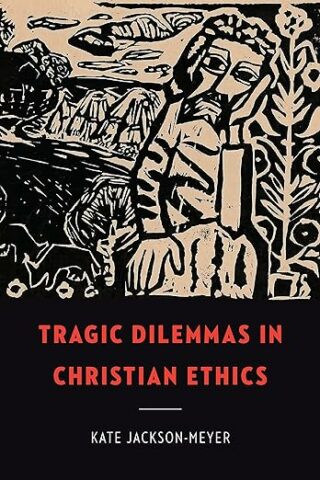Symposium Introduction
Panelists
Tina Beattie
Kevin Carnahan
Mary Roche Doyle
Eric Gregory
Ikuko Matsumoto
Joeseph Wiinikka-Lydon
Overview
Moral dilemmas arise when individuals are unable to fulfill all of their ethical obligations. Tragic dilemmas are moral dilemmas that involve great tragedy. The existence of moral and tragic dilemmas is debated in philosophy and often dismissed in theology based on the notion that there are effective strategies that completely solve hard ethical situations. Yet cases from real-life events in war and bioethics offer compelling evidence for the existence of tragic dilemmas.
In Tragic Dilemmas in Christian Ethics, Jackson-Meyer expertly explores the thought of Augustine and Aquinas to show the limits of their treatment of hard cases, as well as where their thought can be built on and expanded in relation to tragic dilemmas. She recognizes and develops a new theological understanding of tragic dilemmas rooted in moral philosophy, contemporary case studies, and psychological literature on moral injury. Jackson-Meyer argues that in tragic dilemmas moral agents choose between conflicting nonnegotiable moral obligations rooted in Christian commitments to protect human life and the vulnerable. Personal culpability is mitigated due to constrained situations and society is also culpable when tragic dilemmas are a result of structural sin. In response, Jackson-Meyer implores Christian communities to offer individual and communal healing after tragic dilemmas and to acknowledge their own participation in injustice.
Tragic Dilemmas in Christian Ethics offers practical strategies that Christian communities can use to provide healing to those who have acted in tragic dilemmas and to transform the unjust structures that often cause these tragedies.
Reviews and Endorsements
“In this distinguished and undeniably important contribution to Christian ethics, Kate Jackson-Meyer convincingly demonstrates that standard philosophical and theological arguments regarding tragic dilemmas―while illuminating―are ultimately inadequate and unconvincing. More importantly, she continually reminds us that behind all of the scholarly arguments are human beings who have suffered greatly because of the situations in which they found themselves and the choices that so often were forced upon them. Here is a theology infused with compassion whose utmost purpose is to help people who are wounded find healing.”―Paul J. Wadell, professor emeritus of theology and religious studies, St. Norbert College
“Most of us would prefer to turn away from tragedy and avoid moral dilemmas. Perhaps this explains why tragic dilemmas have not received sufficient attention in contemporary Christian ethics, and why this book makes such a helpful and important contribution to the field. With clarity and accessible sophistication, Kate Jackson-Meyer draws upon Augustine, Aquinas, and an array of contemporary sources to develop a framework of analysis that is also deeply grounded in concrete cases and theological insights derived from human experience. This book provides many original insights for scholars, and it would make an excellent text for teaching important issues in fundamental moral theology, such as the relationship between constrained agency and guilt, the role of emotions and experience in moral discernment, and the relationship between intention and foreseeable consequences.”―Christopher P. Vogt, associate professor of theology and religious studies, St. John’s University
“This work deftly mines the best of the Western philosophical and theological tradition as it has grappled with pivotal questions regarding moral agency, trauma and forgiveness. The skillful use of vivid case studies alone makes this an indispensable work for any person of conscience seeking guidance on the perennial project of assessing moral responsibility in a world of great complexity and ambiguity.”―Thomas Massaro, SJ, professor of theology, Fordham University
“Jackson-Meyer’s book is a wonderful meditation on what she recognizes as true moral dilemmas.”―Catholic Books Review
“Jackson-Meyer’s work accomplishes something difficult to do; it sheds new light on a much-discussed subject matter. [H]er work invites such further discussion while at the same time clarifying the difficulty of acting well in a broken world. It is a work well worth reading and pondering, by oneself and even more with others.”―SCOTTISH JOURNAL OF THEOLOGY
“Scholars and graduate students in both philosophy and theology will find the whole argument―which is laid out in the first few pages and reprised in more detail in the conclusion―clear, comprehensive, challenging, and valuable. The rich, focused individual chapters could easily be assigned in seminars for graduate students or advanced undergraduates.”―Journal of the Society of Christian Ethics
“Jackson-Meyer’s work accomplishes something difficult to do; it sheds new light on a much-discussed subject matter It is a work well worth reading and pondering, by oneself and even more with others.”―SCOTTISH JOURNAL OF THEOLOGY
